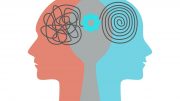Over the past decade, AI has been used to aid humans in many professional fields, which has seen explosive growth and major breakthroughs. In fact, the recent 2023 McKinsey report recognised AI’s potential to boost efficiency and productivity and highlighted its capability to potentially add $2.6 trillion to $4.4 trillion annually to the global economy.
In psychiatry, we’re already seeing AI making headway with healthcare diagnoses – learning from vast datasets and recognising patterns better, faster and with greater accuracy than humans. AI-driven solutions can streamline administrative tasks like patient scheduling, billing, and electronic health record management, while also accelerating patient assessment through AI-assisted tools. By automating these processes, AI allows healthcare professionals, including psychiatrists, to redirect their focus toward patient care, fostering more meaningful doctor-patient interactions and improving the overall healthcare delivery.
Yet, the current mental health care system faces significant challenges. A recent BBC article featuring a report by the Nuffield Trust group, highlighted that the NHS in England cannot meet the soaring demand for autism and ADHD assessments and treatments. Since 2019, the number of people waiting for autism assessments has increased fivefold, and ADHD medication prescriptions have risen by 51%. Additionally, training and hiring enough staff to meet this demand is prohibitively expensive, which is problematic for many healthcare industries that already don’t receive enough funding. Existing staff are also at risk of burnout due to unsustainable workloads.
There are also still widespread concerns that AI might take over and reduce the healthcare workforce, due to advancements seen in other industries where AI has been shown to assist and even replace human professionals. Yet, rather than job displacement, AI in healthcare will enable staff to switch their time and attention to tasks that cannot be automated, and to focus on activities where humans can add more value. Therefore, in order to benefit from this, what is now needed is greater collaboration between healthcare professionals and AI – which will ultimately optimise patient outcomes.
Unlocking AI’s potential
In psychiatric care, AI is revolutionising various facets of administrative support. From managing patient records to optimising operational workflows, AI technologies are simplifying processes that were once labour-intensive and prone to error. By automating routine tasks and providing data-driven insights, AI not only lightens the administrative burden on healthcare professionals but also facilitates better resource allocation and decision-making across healthcare organisations.
AI can fill gaps in mental health care delivery where human resources fall short. By integrating AI into existing workflows, care can be enhanced while maintaining professional oversight. For example, AI-assisted patient assessment tools are crucial in psychiatry for improving diagnostic accuracy and enabling early intervention. By using AI for clinical letter writing, doctors can free up at least 20% of their time, allowing them to focus more on their patients. AI systems can also continuously learn and adapt from new data, ensuring they remain current with the latest medical research and clinical guidelines. This capability leads to more personalised and effective patient care, tailored to the unique needs of each individual.
Yet, while there are many advantages of AI, there are still many ethical considerations that need to be considered in its deployment. Striking a balance between innovation and ethical responsibility ensures that patient safety, confidentiality, and the integrity of clinical decision-making are crucial and high standards need to be upheld.
It will also never be able to replace human intuition, empathy, and critical thinking. In particular, empathy is all about building trust, listening intently to the other person, paying attention to their feelings and needs, and responding in a manner that the other person feels understood. So, the role of the doctor shifts from traditional diagnosis and treatment, to helping patients understand why they may feel the way they do, and what other strategies they can try to improve the situation. This is something AI will never be able to replicate.
That’s not to say there is no place for AI in psychiatry. What we need is strong collaboration between humans and technology. AI will help medical professionals to become more efficient, seamless and less prone to error and mistakes. Plus, human expertise is essential in interpreting AI-generated recommendations, making informed decisions, and providing compassionate patient care. In the near future, AI-driven systems supervised by healthcare practitioners may become common, although their acceptance will vary among individuals.
So, will AI take over psychiatric care?
Despite concerns, AI is not taking over psychiatric care – it is here to support and enhance the work of psychiatrists, ensuring the human element and clinical expertise remains at the forefront of mental health care delivery.
AI can handle tasks such as data analysis, diagnostic support, and administrative duties, allowing psychiatrists more time to engage directly with patients and offer them the emotive, empathic treatment they need. Human expertise also remains essential in interpreting AI-generated recommendations, making informed decisions, and providing compassionate care.
To successfully integrate AI in mental health and psychiatric care, we need to address safety concerns and adapt established practices. Once the safety concerns are resolved, it would be irresponsible not to leverage AI to enhance mental health care. Developing effective methods to collaborate with AI is essential for advancing care, especially as the demand for mental health support surpasses what human resources alone can provide. In turn, this will provide psychiatrists with an opportunity to lead the way in shaping a healthcare model that prioritises both technological advancement and humanistic values, ensuring optimal outcomes for patients and professionals alike.
About the author
Dr Wright is the Chief AI Officer and a practicing consultant psychiatrist at Psychiatry UK, the largest provider of specialist online mental health services in the UK. He led scaling the company’s technology to support over 150,000 patients as its first CTO.
Dr Wright has a strong focus on AI regulation and safety. He has represented the Royal College of Psychiatrists on the Medicines and Healthcare products Regulatory Agency (MHRA) expert advisory group on artificial intelligence, software, and apps, and is a member of the MHRA Digital Mental Health Working Group. He has also participated in the Health Technology Wales Appraisal panel and progressed to the third round of the IBM Watson Artificial Intelligence XPRIZE.





